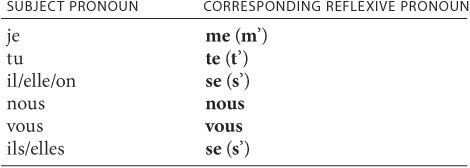
A verb is reflexive when it expresses an action that the subject performs on him/her/itself. The verb in the sentence he washes the car, for example, is not reflexive because it expresses an action that is performed by the subject (he) and received by an object (the car). If the verb is reflexive, the action remains within the subject, or, if you wish, is “reflected” back to the subject. Therefore, the verb in the sentence he washes himself is reflexive. As these examples show, the same verb can exist both in a reflexive and in a non-reflexive form.
There are reflexive verbs in English, such as to burn oneself, to hurt oneself, to cut oneself, to control oneself, and so on, but there are many more in French. In English, reflexive verbs are followed by a pronoun ending in -self (-selves). In French, these verbs are preceded by the reflexive pronoun se (s’ before vowel or mute h) when listed in their infinitive form, such as se présenter (to introduce oneself), s’accuser (to accuse oneself), etc. During the conjugation, this pronoun changes with each person and agrees with the subject in the following way:

Note that il/elle/on and ils/elles have the same reflexive pronoun.
To conjugate a reflexive verb in the present tense, follow the model given below.
se présenter to introduce oneself
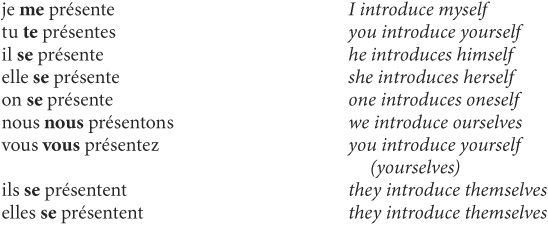
In the negative form, ne precedes the reflexive pronoun, pas follows the verb.

In the interrogative form with est-ce que, the positive word order is retained as with all other verbs.

In the inverted interrogative form, the reflexive pronoun stays before the verb.

Note:
 The reflexive pronouns me, te, se, nous, vous, se are placed immediately before the conjugated verb.
The reflexive pronouns me, te, se, nous, vous, se are placed immediately before the conjugated verb.
 If the verb starts with a vowel or mute h, me, te, and se become m’, t’, and s’:
If the verb starts with a vowel or mute h, me, te, and se become m’, t’, and s’:

 The pronouns me, te, se, etc., correspond to myself, yourself, himself, herself, etc., only if the French reflexive verb has an English equivalent that is reflexive as well, as with ils se blessent (they injure themselves). But since most of the French reflexive verbs are not reflexive in English, the French reflexive pronouns rarely have an equivalent in English: je me lève (I get up), il s’amuse (he has a good time), nous nous douchons (we take a shower).
The pronouns me, te, se, etc., correspond to myself, yourself, himself, herself, etc., only if the French reflexive verb has an English equivalent that is reflexive as well, as with ils se blessent (they injure themselves). But since most of the French reflexive verbs are not reflexive in English, the French reflexive pronouns rarely have an equivalent in English: je me lève (I get up), il s’amuse (he has a good time), nous nous douchons (we take a shower).
Regular verbs
s’amuser to have a good time, enjoy oneself
s’appeler to be named (lit.: to call oneself)
s’arrêter to stop
se cacher to hide
se coucher to go to bed, set (sun)
se demander to wonder
se dépêcher to hurry
se déshabiller to get undressed
se disputer to argue, quarrel, have an argument
s’ennuyer to get/be bored
se fâcher to get angry
s’habiller to get dressed
s’inquiéter to get/be worried
se lever to get up, rise (sun)
se marier (avec) to get married (to), marry
se moquer de to make fun of
se passer to happen
se peigner to comb one’s hair
se promener to go for a walk
se rappeler to remember
se raser to shave
se reposer to rest
se réveiller to wake up
se tromper to be mistaken
se trouver to be (located)
Note: The following verbs have spelling changes during the present tense conjugation:
 S’appeler and se rappeler are conjugated like appeler, i.e., they double the l in all persons except nous and vous.
S’appeler and se rappeler are conjugated like appeler, i.e., they double the l in all persons except nous and vous.
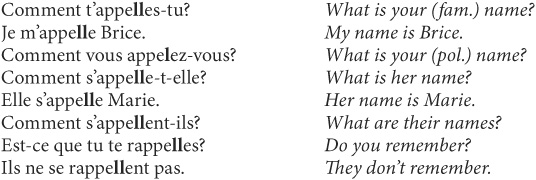
 S’ennuyer changes the y into i in all persons except nous and vous: je m’ennui e, tu t’ennui es, il/elle/on s’ennui e, etc.
S’ennuyer changes the y into i in all persons except nous and vous: je m’ennui e, tu t’ennui es, il/elle/on s’ennui e, etc.
 S’inquiéter (like espérer) changes the accent aigu into an accent grave in all persons except nous and vous: je m’inquiète, tu t’inquiè tes, il/elle/on s’inquiè te, etc.
S’inquiéter (like espérer) changes the accent aigu into an accent grave in all persons except nous and vous: je m’inquiète, tu t’inquiè tes, il/elle/on s’inquiè te, etc.
 Se lever and se promener are conjugated like acheter, i.e., they change -e- into -è- in all persons except nous and vous: je me lè ve, tu te lè ves, il/elle/on se lève, etc.; je me promè ne, tu te promè nes, il/elle/on se promè ne, etc.
Se lever and se promener are conjugated like acheter, i.e., they change -e- into -è- in all persons except nous and vous: je me lè ve, tu te lè ves, il/elle/on se lève, etc.; je me promè ne, tu te promè nes, il/elle/on se promè ne, etc.
EXERCICE
4•1
Traduisez les phrases suivantes en français. (Use reflexive verbs throughout.)
1. I always have a good time. ___________________________
2. They (fem.) are not having a good time. ___________________________
3. What is your name (pol.)? ___________________________
4. What is your name (fam.)? ___________________________
5. My name is Romain. ___________________________
6. What is his name? ___________________________
7. His name is Jean. ___________________________
8. The TGV (= le train à grande vitesse) doesn’t stop often. ___________________________
9. I go to bed late. ___________________________
10. You (pol.) hurry. ___________________________
11. They (masc.) get undressed at night. ___________________________
12. Do you (pol.) argue often with your parents? ___________________________
13. I am bored. ___________________________
14. He never gets angry. ___________________________
15. We get dressed. ___________________________
16. They worry about (pour) their (leur) son. ___________________________
17. Do you (pol.) get up early? ___________________________
18. At what time do you (fam.) usually get up? ___________________________
19. Damien marries my daughter next month. ___________________________
20. They (masc.) make fun of the teacher. ___________________________
21. What (Qu’est-ce qui) is happening? ___________________________
22. The story happens in Canada (au Canada). ___________________________
23. I comb my hair. ___________________________
24. They (fem.) go for a walk every day. ___________________________
25. Do you remember (pol.)? ___________________________
26. I don’t remember any more. ___________________________
27. Where is the train station, please? ___________________________
28. When do you (fam.) rest? ___________________________
29. I wake up when the alarm (le réveil) rings. ___________________________
30. You (pol.) are mistaken. ___________________________
More regular reflexive verbs
s’attendre à to expect
se baigner to go swimming, take a bath
se comporter to behave
se débrouiller to get by, manage
se détendre to relax
se doucher to take a shower
s’entendre (avec) to get along (with)
s’excuser to apologize
se fiancer to get engaged
s’habituer à to get used to
s’intéresser à to be interested in
se maquiller to put on makeup
se noyer to drown
s’occuper de qn/qch to take care of sb/sth
se perdre to get lost
se rendre compte (de) to realize
se spécialiser en to major in
se terminer to come to an end
Note: Se fiancer is conjugated like commencer, i.e., it gets a cédille in the nous form of the present tense (nous nous fiançons).
EXERCICE
4•2
Comment dit-on en français?
1. They (fem.) expect the worst (le pire). ___________________________
2. She goes swimming once a week. ___________________________
3. They (masc.) behave badly. ___________________________
4. I am getting by in French. ___________________________
5. She doesn’t relax. ___________________________
6. I apologize. ___________________________
7. We are getting engaged this summer. ___________________________
8. One gets used to everything. ___________________________
9. Are you (fam.) interested in politics? ___________________________
10. He is majoring in political science. ___________________________
Irregular reflexive verbs
s’apercevoir (de) to notice
s’asseoir to sit down
se conduire to behave
s’en aller to go away
s’endormir to fall asleep
se mettre à (+ inf.) to begin to ( + infinitive)
se plaindre to complain
se sentir to feel (physically or emotionally)
se servir de to use
se souvenir (de) to remember
se taire to be quiet
Note:
 S’apercevoir is conjugated like recevoir: je m’aperçois, nous nous apercevons, etc.
S’apercevoir is conjugated like recevoir: je m’aperçois, nous nous apercevons, etc.
 S’asseoir has two possible conjugations in the present tense.
S’asseoir has two possible conjugations in the present tense.

or:
 S’en aller is conjugated like aller, with en preceding the verb: je m’en vais, tu t’en vas, il/elle/on s’en va, nous nous en allons, vous vous en allez, ils/elles s’en vont.
S’en aller is conjugated like aller, with en preceding the verb: je m’en vais, tu t’en vas, il/elle/on s’en va, nous nous en allons, vous vous en allez, ils/elles s’en vont.
 Se conduire is conjugated like conduire.
Se conduire is conjugated like conduire.
 S’endormir, se sentir, and se servir are conjugated like dormir: je m’endors, nous nous endormons, etc.; je me sens, nous nous sentons, etc.; je me sers, nous nous servons, etc.
S’endormir, se sentir, and se servir are conjugated like dormir: je m’endors, nous nous endormons, etc.; je me sens, nous nous sentons, etc.; je me sers, nous nous servons, etc.
 Se mettre is conjugated like mettre.
Se mettre is conjugated like mettre.
 Se plaindre is conjugated like craindre: je me plains, tu te plains, il/elle/on se plaint, nous nous plaignons, vous vous plaignez, ils/elles se plaignent.
Se plaindre is conjugated like craindre: je me plains, tu te plains, il/elle/on se plaint, nous nous plaignons, vous vous plaignez, ils/elles se plaignent.
 Se souvenir is conjugated like venir: je me souviens, tu te souviens, etc. If the sentence with se souvenir has an object, de precedes it.
Se souvenir is conjugated like venir: je me souviens, tu te souviens, etc. If the sentence with se souvenir has an object, de precedes it.

 Se taire is conjugated like plaire but has no circumflex accent in the third-person singular: je me tais, tu te tais, il/elle/on se tait, nous nous taisons, vous vous taisez, ils/elles se taisent.
Se taire is conjugated like plaire but has no circumflex accent in the third-person singular: je me tais, tu te tais, il/elle/on se tait, nous nous taisons, vous vous taisez, ils/elles se taisent.
EXERCICE
4•3
Traduisez en français les phrases suivantes.
1. They (fem.) never notice their errors (erreurs [f.pl.]). ___________________________
2. I sit down. ___________________________
3. We sit down. ___________________________
4. Do they (masc.) sit down? ___________________________
5. They (fem.) are not going away. ___________________________
6. Are you (fam.) going away? ___________________________
7. We fall asleep. ___________________________
8. I don’t fall asleep. ___________________________
9. He begins to cry. ___________________________
10. They (masc.) complain all the time. ___________________________
11. I don’t feel well today. ___________________________
12. We feel safe. ___________________________
13. You (fam.) behave well. ___________________________
14. I don’t remember this man. ___________________________
15. He doesn’t remember anything. ___________________________
16. Do you (fam.) remember me? ___________________________
17. They (fem.) still remember their (leur) childhood. ___________________________
18. My grandmother always remembers my birthday. ___________________________
19. The Chinese use chopsticks (baguettes [f.pl.]) to eat. ___________________________
20. They (masc.) are never quiet. ___________________________
Contrary to English, French tends to avoid the use of possessive adjectives, such as mon (my), ton (your), son (his/her), etc., when someone does something to a part of his or her own body. Instead, the body part is preceded by the definite article (le, la, les), and the verb is used reflexively. Hence, “I brush my teeth,” is expressed in French by “I brush myself the teeth,” and “she washes her hands” by “she washes herself the hands.”
se brosser les dents to brush one’s teeth

se laver la tête/les cheveux to wash one’s hair

Also:
se brosser les cheveux to brush one’s hair
se sécher les cheveux to dry one’s hair
se casser la jambe to break one’s leg
se raser les jambes to shave one’s legs
se laver les mains to wash one’s hands
se laver la figure to wash one’s face
s’essuyer les pieds to wipe one’s feet
se limer/se couper les ongles to file/cut one’s nails
EXERCICE
4•4
Comment dit-on en français?
1. Do you (fam.) brush your teeth often? ___________________________
2. I wash my hair. ___________________________
3. She shaves her legs. ___________________________
4. You (pol.) brush your hair. ___________________________
5. We wash our hands. ___________________________
6. They (masc.) don’t wipe their feet. ___________________________
7. You (pol.) cut your nails. ___________________________
Normally, the infinitive of a reflexive verb is preceded by se (s’), for example, se lever (to get up). When however the infinitive follows a conjugated verb in a sentence, the reflexive pronoun (which precedes the infinitive) agrees with the subject.

EXERCICE
4•5
Traduisez en français.
1. I would like (Je voudrais) to introduce myself. ___________________________
2. You (fam.) have to hurry. ___________________________
3. We are going to get dressed. ___________________________
4. She doesn’t want to go to bed late. ___________________________
5. Do you (pol.) like to get up early? ___________________________
6. We just got married. ___________________________
7. I cannot remember. ___________________________
8. I want to go swimming. ___________________________
9. You (fam.) are going to manage. ___________________________
EXERCICE
4•6
Est-ce vrai ou faux?
_______ 1. En général, je me couche tard.
_______ 2. Je me lave les cheveux tous les jours.
_______ 3. Je ne m’intéresse pas à la politique.
_______ 4. Je me trompe rarement.
_______ 5. Je ne me plains jamais.
_______ 6. Je m’inquiète pour l’avenir.
_______ 7. Je me brosse les dents deux fois par jour.
_______ 8. Je me fâche souvent.
_______ 9. Je me souviens très bien de mon enfance.
_______ 10. Je m’appelle François.
EXERCICE
4•7
Répondez en français aux questions suivantes.
1. À quelle heure est-ce que le soleil se couche en été? ___________________________
2. Combien de fois par jour vous lavez-vous les mains? ___________________________
3. Quand est-ce que vous vous ennuyez? ___________________________
4. Est-ce que vous vous trompez quelquefois? ___________________________
5. Comment s’appellent vos parents? ___________________________
6. Dans quel pays se trouvent les chutes (falls) du Niagara? ___________________________
7. Quand est-ce que vous vous plaignez? ___________________________
Remplissez les tirets (Fill in the blanks) avec la forme correcte du verbe convenable tirée de la liste suivante. Utilisez chaque verbe une fois seulement.
se reposer, s’ennuyer, s’asseoir, s’arrêter, se dépêcher, se moquer de
1. Quand le professeur est ridicule, les étudiants _____________ lui.
2. Nous _____________ quand la classe n’est pas intéressante.
3. Si on est en retard, on _____________.
4. Quand le métro _____________, les gens descendent.
5. Je suis fatigué(e). Je vais _____________ un peu.
6. Cette place est libre. Vous pouvez _____________ si vous voulez.
EXERCICE
4•9
Remplissez les tirets (Fill in the blanks) avec la forme correcte du verbe convenable de la liste suivante. Utilisez chaque verbe une fois seulement.
se souvenir, se rappeler, s’inquiéter, se coucher, s’endormir, se lever, se plaindre
1. Les élèves _____________ avant un examen.
2. Samedi soir, les jeunes gens _____________ tard. Ils sont si fatigués qu’ils _____________ tout de suite.
3. Le dimanche matin, je fais la grasse matinée, c’est-à-dire je ne ______________ pas ______________ avant midi.
4. Qu’est-ce que vous avez fait le jour de votre troisième anniversaire? —Je ne _____________ pas!
5. J’ai une mauvaise mémoire. Je ne _____________ de rien.
6. Quand le professeur donne trop de devoirs, les étudiants _____________.
Traduisez en français.
My name is Anne, and I am twenty years old. Every morning, I wake up at seven o’clock, but I don’t get up right away. I stay in bed for thirty minutes. Then, I brush my teeth and take a shower. I put on my makeup and get dressed. Then, I eat breakfast. Afterward, I go to work. When it is late, I hurry because I don’t want to be late. At noon, I eat a ham sandwich and a piece of apple pie. In the afternoon, I go for a walk or I take a rest. At five P.M., I go home. In the evening, I sit down in front of the television, and I relax.
I am rarely worried, and I am never bored. Sometimes, I go out to a nightclub with my friends, and I have a good time. At midnight, I get undressed, and I go to bed. I usually fall asleep quickly.
VOCABULAIRE


While some French reflexive verbs, such as se souvenir (to remember), se moquer de (to make fun of), s’en aller (to go away), only occur in the reflexive form, most also exist in a non-reflexive form.
Of these verbs, many have the same meaning both in their reflexive and non-reflexive forms. Compare:
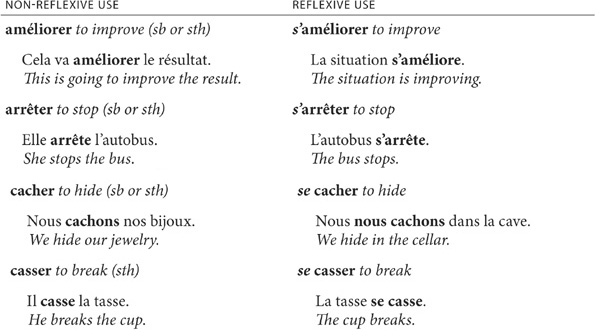
EXERCICE
4•11
Reflexive or not? Choose the verb that fits in the sentence. Then write the correct form of this verb in the present tense. Remember that when the verb is reflexive, the action is performed and received by the subject.
1. Nous (arrêter/s’arrêter) ______________ au feu rouge.
2. Nous (arrêter/s’arrêter) ______________ le taxi.
3. Ils (cacher/se cacher) ______________ leur argent sous le lit.
4. Ils (cacher/se cacher) ______________ derrière l’arbre.
5. Je (réveiller/se réveiller) ______________ tôt tous les jours.
6. Je (réveiller/se réveiller) ______________ les enfants à six heures.
7. Les chasseurs (tuer/se tuer) ______________ les biches.
8. Certains jeunes gens (tuer/se tuer) ______________ par désespoir.
9. Tu (inquiéter/s’inquiéter) ______________ de ton avenir.
10. Tu (inquiéter/s’inquiéter) ______________ tes amis.
Some verbs however have a different meaning in their reflexive and non-reflexive forms. Compare:
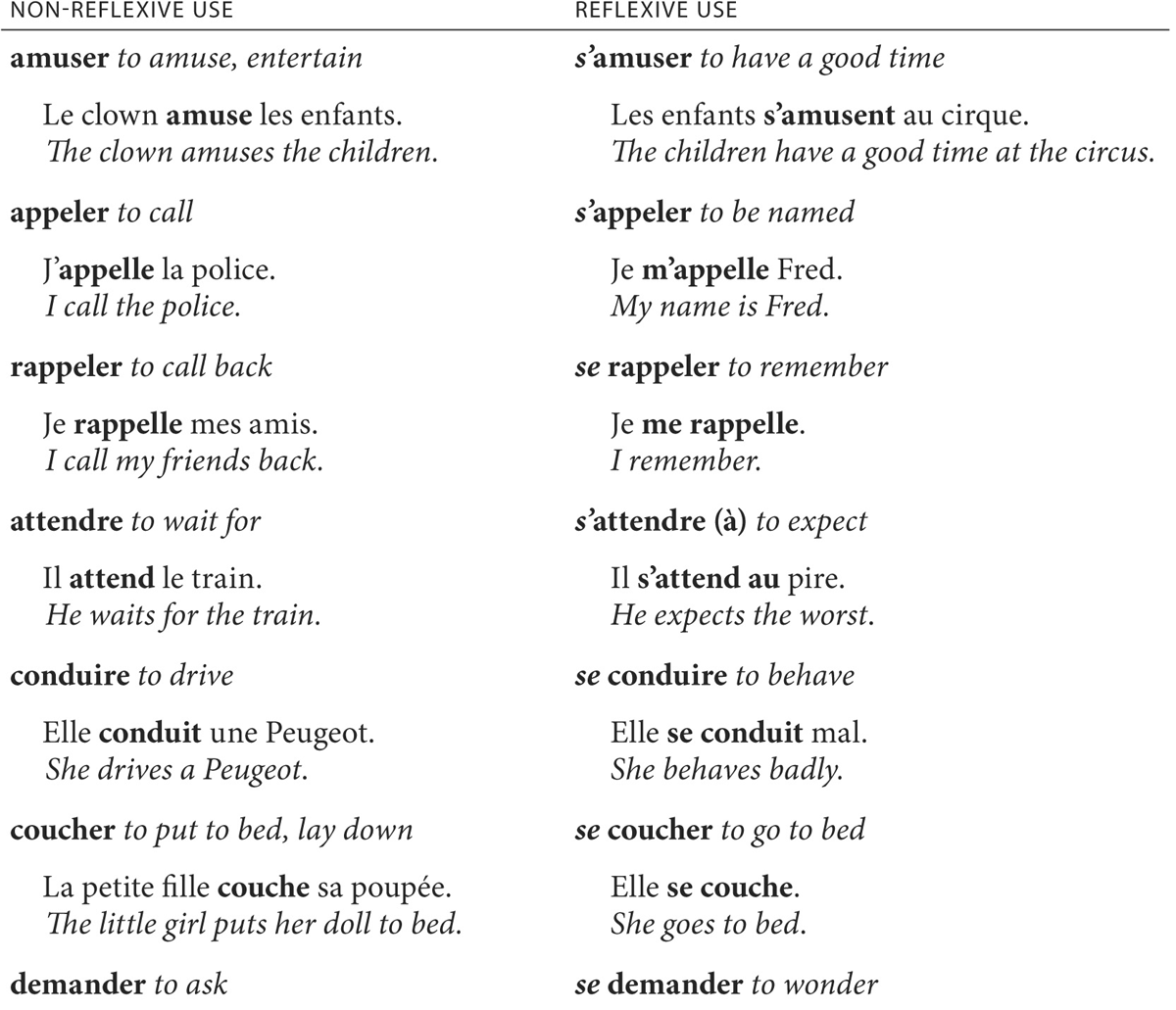
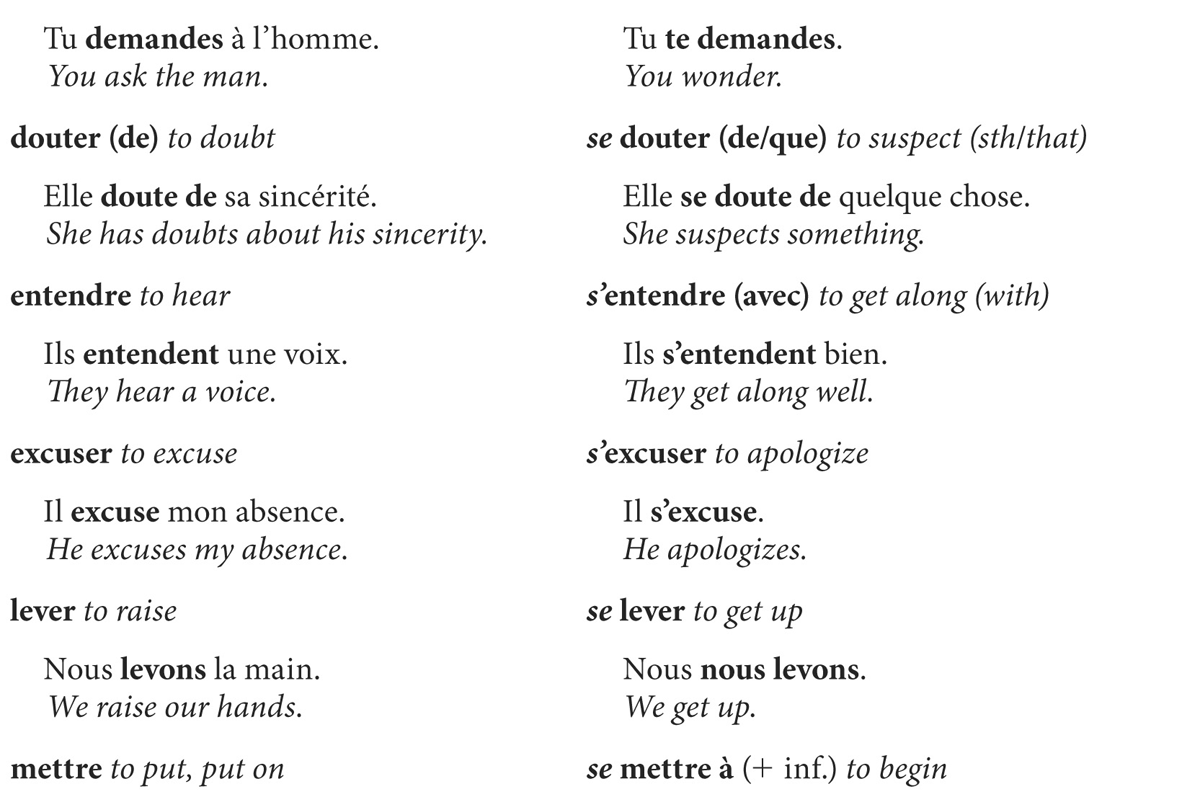
EXERCICE
4•12
Reflexive or not? Choose the verb that fits in the sentence. Then write the correct form of this verb in the present tense.
1. Les comiques (amuser/s’amuser) ______________ les gens.
2. Les adolescents (amuser/s’amuser) ______________ bien aux boums.
3. Elle (appeler/s’appeler) ______________ Suzanne.
4. Le professeur (appeler/s’appeler) ______________ l’étudiant.
5. Je te (rappeler/se rappeler) ______________ ce soir.
6. Je ne (rappeler/se rappeler) ______________ pas son nom.
7. Est-ce que vous (attendre/s’attendre) ______________ le facteur?
8. À quoi est-ce que vous (attendre/s’attendre) ______________ ?
9. Si on insulte les gens, on ne (conduire/se conduire) ______________ pas bien.
10. Si on a beaucoup d’accidents de voiture, on (conduire/se conduire) ______________ probablement mal.
11. La mère (coucher/se coucher) ______________ les enfants à sept heures.
12. Ma mère (coucher/se coucher) ______________ toujours tard.
13. Je (demander/se demander) ______________ à mes parents de m’accompagner.
14. Il n’est pas venu. Je (demander/se demander) ______________ pourquoi.
15. Il (excuser/s’excuser) ______________ d’être en retard.
16. Il (excuser/s’excuser) ______________ mon retard.
17. Nous (mettre/se mettre) ______________ les fleurs dans le vase.
18. Nous (mettre/se mettre) ______________ à rire.
19. Cette histoire (passer/se passer) ______________ en Russie.
20. Elle (passer/se passer) ______________ à la douane.
21. Je (promener/se promener) ______________ tous les dimanches.
22. Je (promener/se promener) ______________ mon caniche tous les soirs.
23. Ce monsieur n’a pas raison, il (tromper/se tromper) ______________.
24. Ce monsieur (tromper/se tromper) ______________ sa femme depuis longtemps.
25. Ils ne (trouver/se trouver) ______________ pas la sortie.
26. Ces châteaux (trouver/se trouver) ______________ dans le Val de Loire.
27. Où (trouver/se trouver) ______________ la bibliothèque?
When two or more people do something to one another, French uses the plural reflexive pronouns (nous, vous, se) to express each other.

EXERCICE
4•13
Comment dit-on en français?
1. They (masc.) understand each other. ___________________________
2. We love each other. ___________________________
3. Do you see each other often? ___________________________
4. They (fem.) hate each other. ___________________________
5. You help each other. ___________________________
6. They (masc.) hug each other. ___________________________
7. They (fem.) don’t speak to each other anymore. ___________________________
8. Have you known each other for a long time? ___________________________
9. My daughter and I telephone each other every other day (tous les deux jours). ___________________________
10. We say “hello” to each other. ___________________________
French transitive verbs, that is, verbs that take an object, are sometimes used with the reflexive pronoun se (s’) in the third-person singular or plural to replace the passive voice (English: is/are + past participle) or a construction with on (one). The subject of these sentences is always a thing, frequently the pronoun cela (that), or its abbreviated form ça. Usually, a habit or general truth is expressed in this manner.

EXERCICE
4•14
Remplacez le sujet on par la forme pronominale (se + verbe). (Rewrite the following sentences using a reflexive construction with a passive meaning.)
Exemple: On boit le vin rouge chambré (at room temperature). Le vin rouge se boit chambré.
1. On ouvre les portes du magasin à neuf heures. ___________________________
2. On écrit le mot « adresse » avec un seul « d ». ___________________________
3. On lave ce costume à la main. ___________________________
4. On ne fait pas ça en France. ___________________________
5. On ne dit pas « visiter quelqu’un ». ___________________________
6. On joue la pièce à la Comédie-Française. ___________________________
7. On emploie souvent cette expression. ___________________________
8. On voit la tour Eiffel de loin. ___________________________
9. Comment dit-on « singe » en anglais? ___________________________
10. On n’apprend pas le français en un jour. ___________________________
EXERCICE
4•15
Est-ce vrai ou faux?
_______ 1. Les quatre langues non-romanes qui se parlent en France sont le basque, l’alsacien, le breton et le flamand.
_______ 2. L’ozone est un gaz qui ne se voit pas et ne se sent pas.
_______ 3. « We are having a good time » se traduit en français par « Nous avons un bon temps ».
_______ 4. « I am cold » se dit « Je suis froid » en français.
_______ 5. Dans une école française, tous les cours se donnent en anglais.
_______ 6. En France, la salade se mange après le plat principal.
_______ 7. La marche de Mendelssohn se joue aux mariages.
_______ 8. La maladie Alzheimer ne se guérit pas.